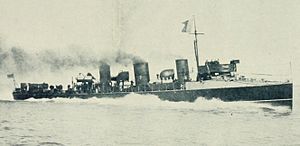HMS Viper (1899)

HMS Viper
|
|
| History | |
|---|---|
|
|
|
| Name: | HMS Viper |
| Ordered: | 4 March 1898 |
| Builder: | Hawthorn Leslie and Company |
| Laid down: | 1898 |
| Launched: | 6 September 1899 |
| Commissioned: | 1900 |
| Fate: | Struck rocks near Alderney, 3 August 1901 |
| General characteristics | |
| Class and type: | Viper-class torpedo boat destroyer |
| Displacement: |
|
| Length: | 210 ft 3 1⁄2 in (64.10 m) |
| Beam: | 21 ft (6.40 m) |
| Draught: | 9 ft 9 in (2.97 m) |
| Propulsion: | Parsons turbines, 10,600 ihp (7,904 kW) |
| Speed: | 33.8 knots (63 km/h; 39 mph) |
| Complement: | 68 |
| Armament: |
|
HMS Viper was a Viper-class torpedo boat destroyer (or "TBD") built for the British Royal Navy in 1899 by Hawthorn Leslie and Company at Hebburn on the River Tyne.
She was notable for being the first warship to use steam turbine propulsion and was manufactured by Parsons Marine. There were four shafts, with two propellers on each, one inboard and one outboard of the shaft A-bracket.
Viper and another turbine-powered ship, the Armstrong Whitworth special-type Cobra were both lost to accidents in 1901: Viper foundered on rocks in fog during naval manoeuvres near Alderney on 3 August 1901, while Cobra broke her back in a storm in the North Sea on 18 September 1901. Since then the Royal Navy has not used snake names for destroyers.
Following the success of the turbine-powered yacht Turbinia, the British Admiralty, whose previous attempts at acquiring destroyers faster than the standard "thirty-Knotters", the reciprocating-engined Albatross, Express and Arab had been unsuccessful, placed an order on 4 March 1898 with Parsons Marine for a turbine-powered destroyer, HMS Viper. Parsons subcontracted the ship's hull to Hawthorn Leslie and Company of Tyneside, with Viper being laid down later that year.
...
Wikipedia
